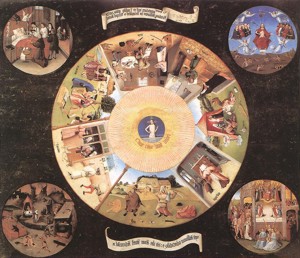 So, what about the gospel? Is there a Third Way for the gospel? Isn’t the traditional gospel the real gospel? Jim Belcher, in Deep Church: A Third Way Beyond Emerging and Traditional
So, what about the gospel? Is there a Third Way for the gospel? Isn’t the traditional gospel the real gospel? Jim Belcher, in Deep Church: A Third Way Beyond Emerging and Traditional , poses this question by examining the gospel in Brian McLaren.
, poses this question by examining the gospel in Brian McLaren.
Jim Belcher says the problem for the emerging criticism of tradition is that the gospel is reduced to forgiveness and eternal life; the critics of Brian say he has reduced the gospel to social justice, and therefore resurrected the social gospel. Belcher says the problem is there is reductionism on both sides and he proposes a Third Way.
I do have a critique here, and I wish Jim had provided as much critical evaluation of a traditonalist — one that really does spend too much time seeing the gospel as fire insurance and leading too much to concern with life after death and not enough with life in the here and now.
So, I’m wondering if you readers have any really clear examples of the gospel reduced in that direction? I’m not asking for names so much as sterling examples.
The issue is the lack of “kingdom of God” theology in traditionalist approaches to the gospel and the lack of soteriology/personal faith in the social gospel approach. As Jim says of the traditionalist critique of Brian: “The traditional church doesn’t believe Brian is trying to correct a tragic reduction of the gospel; they see in him and the emerging church a wholesale abandonment of the gospel” (111). Jim focuses on Brian’s writings and criticizes him for the lack of emphasis — and at times presence — of a blood-based soteriology. “As I have made clear,” Belcher concludes, “I appreciate Brian’s stress on kingdom living, but his description leaves us powerless to enter the kingdom and to live it out” (118).
As I stated in
my article about Brian McLaren in CT, I agree that Brian’s writings — especially his more recent ones — have not had enough atonement theology at work. But I’m also keen to emphasize that there are weaknesses on the other side of not integrating justice, discipleship and a kingdom vision into the gospel. (I don’t, for instance, think “kingdom” simply means “justice” as many think it does — and Jim leaned a bit in that direction. I’ve done a long series and I don’t think you can ever find “kingdom” passages in the Gospels that are absent of the idea of “group/church/ecclesiology” or of discipleship to Jesus. Reducing kingdom to justice is a huge mistake.)
Belcher’s Third Way proposal: Gospel — Community — Mission — Shalom.
Now, what I would ask Jim is this: Define “gospel” for us. Here is his definition: “The ‘gospel’ is the good news that through Jesus, the Messiah, the power of God’s kingdom has entered history to renew the whole world. … When we believe and rely on Jesus’ work and record (rather than ours) for our relationship to God, that kingdom power comes upon us and begins to work through us…. The gospel motivates, guides, and empowers every aspect of our living and worship” (120-121).
 So, what about the gospel? Is there a Third Way for the gospel? Isn’t the traditional gospel the real gospel? Jim Belcher, in Deep Church: A Third Way Beyond Emerging and Traditional
So, what about the gospel? Is there a Third Way for the gospel? Isn’t the traditional gospel the real gospel? Jim Belcher, in Deep Church: A Third Way Beyond Emerging and Traditional, poses this question by examining the gospel in Brian McLaren.

